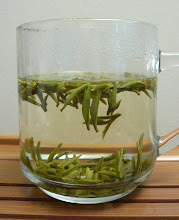I have been thinking about this for a while, on a few teas and tea regions. But I wasn't sure where to start. So I will just write whatever comes to my mind first, under the influence of recent green tea influx :-)
First of all, over the past weekend, a lot of new green tea arrived :-) including 2 different Huang Shan Mao Feng. I wrote about the semi-wild Huang Shan Mao Feng before. These days, it's the other one, the 1400m Huang Shan Mao Feng, that makes me think.
This is the dry tea leaves of the first harvest.
The supplier, Mr. Wang told me, some tea vendors asked him if he could supply "even higher grade". First he didn't understand - "This is already the earliest harvest from the highest elevation. It's our highest grade!" But then he was told that the demand of "even higher grade" has no offense to the current tea. But if the tea could get their larger leaves removed and mainly buds and young leaves of consistent size remained, then the tea would look of "much higher grade" and would be sold out very fast. (In Chinese market, people are crazy about physical appearance of green tea!) Some vendor says, "Nowadays there are more and more affluent people in my region. They don't hesitate to spend big money but they demand the best of the best."
But I told Mr. Wang that I vote for no more removing and trimming of leaves! I don't think it will improve the taste a lot, if at all. And it cost a lot of labor hours, hence money! I don't think I speak just for my own economic interest and because I don't want t spend more money. Indeed I don't want to spend more money just for better look, but my main concern is, over-refining an already good tea product just doesn't make sense to me and isn't something the tea world should nurture.
Besides, I think although the untrimmed tea may not look as good as trimmed tea in dry tea leaves, it looks just as beautiful once brewed in hot water. I've found this in quite a few rough looking tea, including the Tong Cheng Small Orchid that I love.
What do you think? ;-)
What led me to this tea was sort of "tea karma". In April of 2010, earthquake catastrophe broke out in Yushu, Qinghai, very close to the hometown of a best friend of mine (who shares hometown with Dalai Lama). Then, on a Chinese online tea forum, I saw an announcement of charity sale of Huang Shan Mao Feng run by Mr. Wang. He put some of his best tea on sale and donated all the money to the earthquake region. So I bought some tea from him. It didn't cost me any extra. I just bought some very nice tea for a very fair price. It was him who made the donation of tea and money. But still he thanked me for a few times and told me I was the first buyer in the charity sale. Because of this charity sale, I've known Mr. Wang as a man who cares a lot for people and society beyond his own life. And Mr. Wang appreciated my support in the sale. Hence started our friendship.
Later I learned that Mr. Wang is a part-time tea seller (just as I am!) who is son of a farmer's family from a remote village of Yellow Mountain (Huang Shan). He has a well-paid job in Hefei, a big city 100 miles away from Yellow Mountain, and selling tea by far can't compensate him as well as his day job. But he feels like to do it because he strongly dislikes the tea middlemen who come to his village every year and offer lowest price for their high quality tea. Their village is 8km (5 miles) away from the nearest road. In all those years, most farmers have no other choice but selling tea to middlemen for a rather low price, despite that their village is one of the most elevated ones for Huang Shan Mao Feng cultivation, and their tea is of the top quality. So a few years ago, Mr. Wang started to take his family tea to Hefei City, selling it to his colleagues, friends, and then, later on, friends' friends. Then, some neighbors in his village asked him to help sell their tea too. So he started taking pre-orders each spring, among friends and on a popular online tea forum, to determine how much tea he could sell from various farmers in his village. Each year, the tea would be carried by either Mr. Wang or a cousin of his, on foot, for 5 miles down the mountain. Usually it takes multiple carriers or multiple trips of some carriers. Then the tea would travel by train to Hefei City. Then, as you know, some of the tea would travel by air to America :-)
In the past a few years, Mr. Wang told me, again and again, that besides selling tea for his family and village, another issue that he can't get off mind is getting a road built toward his village. Currently, his village is the only one in the region that's not accessible by an automobile road. The road project has been on the agenda of the county for more than 10 years, but was delayed again and again due to budget or various other reasons. As a young man who has the most education among his villagers and works in the "big city", Mr. Wang carries a lot of hope of his fellow villagers. He often says he is determined to use all his network and "lobbying power" to make the road happen as soon as possible.
When I first heard of Mr. Wang's dream of a road, my first response was, "No...!" Mr. Wang convinced me for a few times that his village is the one in the deepest mountain, and therefore will be the end of the road and will not have much passing traffic even with a road. He said, "You don't have to worry about automobile contamination on the tea fields." But actually my concern was not the contamination problem. What stroke me was thinking of a paradise lost. Yellow Mountain is the dream paradise of Chinese people of generations. The village in the mountain is like where paradise and human world connects. But, have you seen a paradise with automobile roads? No...! Meantime, I knew it was not my say, and it would be rather selfish to want the village stay road-less. But deep in my heart, I felt I was still 70% against the road. Then, recently, Mr. Wang showed me a few pictures he took on their mountain trails. The pictures left me speechless and now I think I'm mostly for the road project (although I don't have any power to push it forward anyway...)
This is the best part of the mountain trail. Villagers need to travel on it every a few days to buy food and household items. Children need to travel on it every day to go to school, all the 5 miles, round trip! Patients need to be carried down the mountain to see the doctor in the nearest town. In fact, when seeing these pictures, I feel even the previously mentioned "tea middlemen" are not that bad. They buy tea for low prices and villagers don't like them. But they have to work harder than many other middlemen anyway, because they have to travel on this trail up and down too, to carry the tea out of the mountain. A traveler would think the remote village at the end of the scenic trail is paradise. But only people living there know how hard life could be. So I feel if I can't handle every day life in a remote village like this for many years, I shouldn't expect local people to live like this without access to a road.
I believe there will be a road in a few years. Mr. Wang is still fighting for it. But I'm sure he will make it happen. I have all the best wishes for the road and for the village, and I believe the road will bring better life to local people. Not without a little sentimentality though, and it reminds me of many other things we have gained and lost in modern life.
六堡茶道美学煮茶
3 years ago


































3 comments:
I loved your post. I think if more people knew about how tea gets from plant to table, they wouldn't mind paying the price. The last time I drank Huang Shan Mao Feng, I didn't think about how "imperfect" the tea leaves were. All I remember is that it tasted divine. Isn't that the point?
I totally agree with Gustia on the post, and about how connecting us with the tea can go a long way towards encouraging a willingness within the buyer to pay the price for it.
I always enjoy reading your posts, Gingko. I agree with many things you said here, but unfortunately I don't have the time at the moment to address them. Thank you for sharing your insights with us!
Hi guys, thank you for your comments! Indeed, part of the process of my learning about tea is about learning how much work is involved in it! Then, there is the problem that compensation structure in tea trade is not always perfect. Good thing is nowadays more and more producers (or very often their younger children in the families) are reaching to the "outside" world and there are more and more "direct trade" going on!
Post a Comment